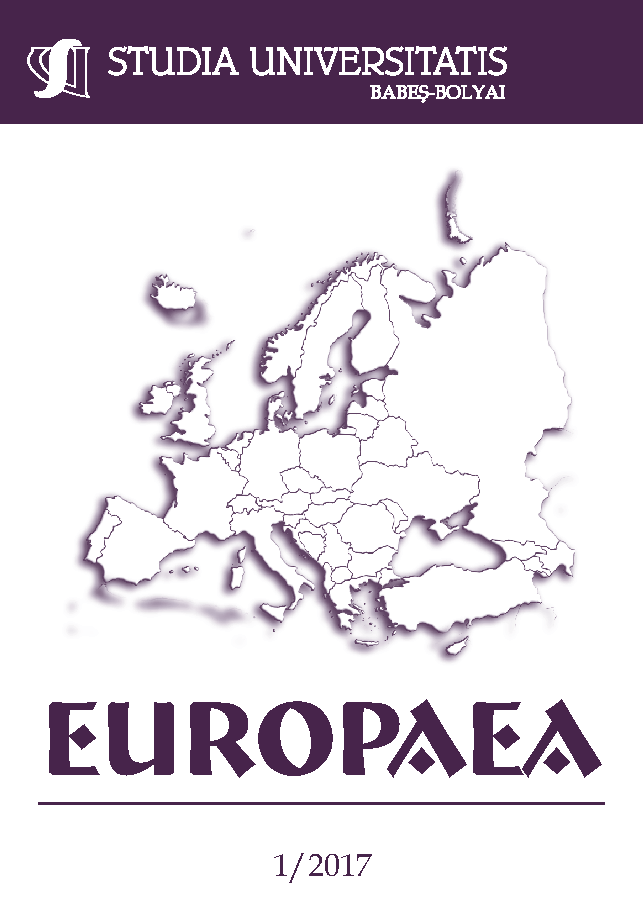THE CONDITIONAL IMPACT OF DEMOCRACY CONDITIONS. HOW THE EUROPEAN UNION INTERACTS WITH POLITICAL COMPETITION IN EASTERN PARTNERSHIP COUNTRIES
DOI:
https://doi.org/10.24193/subbeuropaea.2017.1.08Keywords:
Europeanization, democratic conditionality, European neighbourhood, Eastern PartnershipAbstract
In the debate about the European Neighbourhood Policy, two positions may be distinguished: those who propose a stricter and more consistent use of democratic conditionality, prioritizing democracy over other EU objectives - and those who refuse to set compliance with democratic standards as a precondition for support, expecting democracy to emerge from closer linkages. The paper argues that both positions do not sufficiently recognize the selective effectiveness of EU conditionality. Democracy conditions can become effective if (1) dense societal, economic and cultural ties with the EU support their domestic acceptance and (2) ruling political elites are faced with a competitive opposition. While the EU cannot generate or reinforce domestic political competition in Eastern Partnership countries, its democracy conditions can become effective in competitive constellations by helping domestic political actors to agree on institutional constraints to executive authority or on mechanisms of executive accountability. The EU's democracy conditions remain ineffective in less competitive political systems, because their ruling political elites lack incentives to cooperate with the opposition.
References
Bechev, Dimitar; Nicolaïdis, Kalypso (2010), "From Policy to Polity: Can the EU's Special Relations with Its 'Neigbourhood' Be Decentred?", in Journal of Common Market Studies, 3, 48, 475-500.
Checkel, Jeffrey T.; Katzenstein, Peter J., eds. (2009), European Identity, Cambridge: Cambridge University Press.
Commission, European (2015), Review of the European Neighbourhood Policy, Brussels: European Commission, High Representative of the European Union for Foreign Affairs and Security Policy, Communication JOIN(2015) 50.
Delcour, Laure (2011), The Institutional Functioning of the Eastern Partnership: An Early Assessment, Tallinn: Estonian Center of Eastern Partnership, Eastern Partnership Review 1.
Edwards, Geoffrey (2008), "The Construction of Ambiguity and the Limits of Attraction: Europe and its Neigbourhood Policy", in Journal of European Integration, 1, 30, 45-62.
Emerson, Michael; Youngs, Richard, (2009), Democracy's Plight in the European Neighbourhood: Struggling Transitions and Proliferating Dynasties, Brussels: Centre for European Policy Studies [u.a.].
European Commission (2011), A New Response to a Changing Neighborhood, Brussels: European Commission, High Representative of the European Union for Foreign Affairs and Security Policy, Joint Communication COM(2011)303.
European Union (2016), Shared Vision, Common Action: A Stronger Europe. A Global Strategy for the European Union’s Foreign and Security Policy, Brussels: European Union.
EVS (2010), European Values Study 2008. 4th Wave. Integrated Dataset, Cologne: GESIS Data Archive, ZA4800 Data File Version 2.0.0 (2010-11-30), doi:10.4232/1.10188, 17 May 2017.
Expertengruppe Östliche Partnerschaft (2012), Deutsche Außenpolitik Und Östliche Partnerschaft, Berlin: DGAP, Standpunkt 1.
Freedom House (2012), Freedom in the World 2012. The Annual Survey of Political Rights and Civil Liberties, Lanham: Rowman & Littlefield.
Gawrich, Andrea; Melnykovska, Inna; Schweickert, Rainer (2010), "Neighbourhood Europeanization through ENP: The Case of Ukraine", in Journal of Common Market Studies, 5, 48, 1209-35.
Gerhards, Jürgen; Hölscher, Michael (Cooperation) (2006), Kulturelle Unterschiede in der Europäischen Union. Ein Vergleich zwischen Mitgliedsländern, Beitrittskandidaten und der Türkei, Wiesbaden: VS Verlag für Sozialwissenschaften, 2. edition.
Giusti, Serena (2016), "The EU's Transformative Power Challenged in Ukraine", in European Foreign Affairs Review, 2, 21, 165-84.
Grzymała-Busse, Anna, (2007), Rebuilding Leviathan. Party Competition and State Exploitation in Post-Communist Democracies, Cambridge: Cambridge University Press.
Gstöhl, Sieglinde, ed. (2016), The European Neighbourhood Policy in a Comparative Perspective: Models, Challenges, Lessons, London, New York: Routledge.
International Renaissance Foundation, (2012), European Integration Index for Eastern Partnership Countries, Kiev: K.I.S. Publishing.
Kaufmann, Daniel; Kraay, Aart; Mastruzzi, Massimo (2009), Governance Matters Viii: Aggregate and Individual Governance Indicators 1996-2008, Washington: World Bank, Policy Research Working Paper 4978, http://papers.ssrn.com/sol3/papers.cfm?abstract_id=1424591, 17 May 2017.
Korosteleva, Elena A., (2012), Eastern Partnership. A New Opportunity for the Neighbours?, London [u.a.]: Routledge.
Laitin, David D., (2002), Culture and National Identity: 'The East' and European Integration, in Mair, Peter; Zielonka, Jan (eds.), Secondary Culture and National Identity: 'The East' and European Integration, London: Frank Cass, 55-80.
Lang, Kai-Olaf; Lippert, Barbara (2012), The EU and its Neighbours. A Second Chance to Marry Democratisation and Stability Berlin: SWP, Comments 2.
Lavenex, Sandra; Schimmelfennig, Frank (2011), "EU Democracy Promotion in the Neighborhood: From Leverage to Governance?", in Democratization, 4, 18, 885-909.
Levitsky, Steven; Way, Lucan A. (2010), Competitive Authoritarianism. Hybrid Regimes after the Cold War, Cambridge: Cambridge University Press.
Naumescu, Valentin, ed. (2015), The European Union's Eastern Neighbourhood Today. Politics, Dynamics, Perspectives, Newcastle upon Tyne: Cambridge Scholars Publ.
O'Dwyer, Conor, (2006), Runaway State-Building. Patronage Politics and Democratic Development, Baltimore: Johns Hopkins University Press.
Sasse, Gwendolyn (2013), "Linkages and the Promotion of Democracy: The Eu's Eastern Neighbourhood", in Democratization, 4, 20, 553-91.
Sifft, Stefanie; Brüggemann, Michael; Kleinen-V.Königslöw; Peters, Bernhard; Wimmel, Andreas (2008), "Segmented Europeanization: Exploring the Legitimacy of the European Union from a Public Discourse Perspective", in Journal of Common Market Studies, 1, 45, 127-55.
Stykow, Petra (2013), "Wahlen in autoritären Regimen: Die postsowjetischen Länder im Vergleich", in Politische Vierteljahresschrift, Sonderheft 47, 237-71.
Youngs, Richard (2009), "Democracy Promotion as External Governance?", in Journal of European Public Policy, 6, 16, 895-915.
Youngs, Richard (2010), Introduction. Idealism at Bay, in Youngs, Richard (ed.), The European Union and Democracy Promotion, Baltimore: Johns Hopkins University Press, 1-15.
Downloads
Published
How to Cite
Issue
Section
License
Copyright (c) 2017 Studia Universitatis Babeș-Bolyai Europaea

This work is licensed under a Creative Commons Attribution-NonCommercial-NoDerivatives 4.0 International License.



